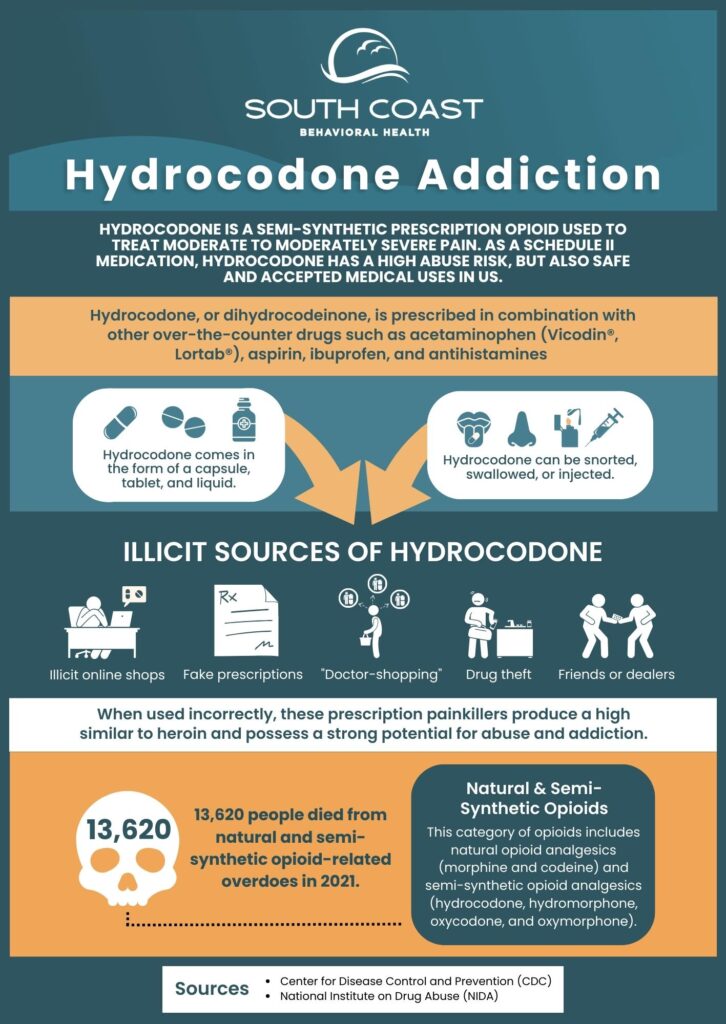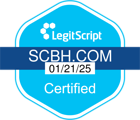Hydrocodone Addiction
Hydrocodone addiction is a growing concern in the realm of substance abuse, raising alarming health and societal issues. Hydrocodone, a powerful prescription opioid painkiller, is often prescribed to manage moderate to severe pain. However, its potential for abuse potentially leading to opioid use disorder (OUD) has resulted in a significant public health crisis.
This addictive drug, found in various forms such as Vicodin and Lortab, can lead individuals down a path of physical and psychological dependence. Understanding the signs, symptoms, and treatment options for hydrocodone addiction is essential to addressing this pressing issue.

What Is Hydrocodone Addiction?
Hydrocodone is a potent opioid painkiller that plays a crucial role in managing moderate to severe pain. It’s commonly prescribed after surgeries, injuries, or medical procedures to alleviate discomfort. As an opioid, it is chemically similar to morphine and has a high potential for abuse, which has led to growing concerns regarding hydrocodone addiction. This prescription medication can be found in various forms, often in combination with other non-opioid pain relievers like acetaminophen.
Common brand names for these combinations include:
- Vicodin
- Lortab
- Norco
While hydrocodone can provide much-needed relief for patients dealing with intense pain, its power can also make it highly addictive, even when taken as directed by a healthcare professional. The rise in hydrocodone addiction is a significant public health issue.
According to the Substance Abuse and Mental Health Services Administration (SAMHSA), in 2019, an estimated 9.7 million people in the United States misused prescription pain relievers, including medications containing hydrocodone. This misuse can lead to a range of serious health consequences, including addiction, overdose, and even death. Understanding the potential dangers of hydrocodone and recognizing the signs of addiction are essential steps in addressing this growing problem and finding appropriate interventions and treatments for individuals in need.
Why Is Hydrocodone Dangerous?
Hydrocodone can be dangerous when abused due to its potential for addiction and severe health consequences. Abuse can lead to respiratory problems, overdose, and an increased risk of mental health issues. This opioid’s misuse can result in a range of adverse physical, emotional, and social outcomes, making it a serious public health concern. Here are some of the risks:
- Physical Health Risks: Hydrocodone can lead to severe physical health consequences. Its use may result in slowed breathing, dizziness, fainting, and, in some cases, overdose. Overdose can be fatal, as it may cause respiratory failure.
- Mental and Emotional Impacts: Hydrocodone addiction can severely affect one’s mental health. Individuals may experience mood swings, irritability, and depression, which can have a profound impact on their overall well-being.
- Behavioral Consequences: Hydrocodone misuse can lead to various behavioral problems. As addiction takes hold, individuals may engage in risky behaviors to obtain the drug, such as doctor shopping or obtaining it illegally.
- Potential for Legal Issues: Obtaining hydrocodone without a prescription or engaging in illegal activities to sustain addiction can lead to legal problems. Individuals may face charges related to drug possession, fraud, or theft, potentially resulting in incarceration.
- Negative Impact on Quality of Life: Hydrocodone addiction can substantially diminish one’s quality of life. The drug’s grip on an individual’s health and well-being may lead to the breakdown of familial and social relationships, damaged personal and professional lives, and isolation.
Understanding these dangers is essential for early intervention and providing support to those who may be struggling with hydrocodone addiction.
The Link Between Hydrocodone Addiction and Mental Health
Hydrocodone addiction often intertwines with mental health concerns, forming a complex relationship. This co-occurrence is known as a dual diagnosis or co-occurring disorders. Individuals who suffer from mental health conditions, such as anxiety, depression, or post-traumatic stress disorder, may turn to hydrocodone as a way to self-medicate and alleviate emotional pain. This can lead to a dangerous cycle of substance abuse.
Statistics indicate a substantial prevalence of co-occurring disorders among those with hydrocodone addiction. A report from the Substance Abuse and Mental Health Services Administration (SAMHSA) suggests that in 2019, around 9.5 million adults in the U.S. experienced both a mental illness and a substance use disorder, highlighting the widespread nature of co-occurring disorders. Recognizing this link is essential in providing comprehensive care for individuals struggling with both mental health issues and hydrocodone addiction.
When Do You Need Hydrocodone Addiction Treatment?
Seeking hydrocodone addiction treatment is crucial when an individual’s use of this medication has evolved into a compulsive and problematic behavior. There are several signs and scenarios that should prompt someone to consider professional help:
- Loss of Control: When the person can no longer control their hydrocodone use, frequently taking it in larger amounts or for longer periods than intended
- Cravings and Urges: Experiencing intense cravings and urges for hydrocodone, leading to a persistent desire to use the drug.
- Neglecting Responsibilities: Failing to fulfill obligations at work, school, or home due to hydrocodone use, which may result in job loss, academic difficulties, or family conflicts.
- Continued Use Despite Problems: Persisting in hydrocodone use despite knowing that it causes or worsens physical or psychological issues, such as health problems, strained relationships, or financial hardship.
- Dangerous Use: Using hydrocodone in physically hazardous situations, like when operating heavy machinery, which increases the risk of accidents and injuries.
- Withdrawal Symptoms: Experiencing withdrawal symptoms when attempting to stop or reduce hydrocodone use. These symptoms may include anxiety, muscle aches, nausea, and intense drug cravings.
- Tolerance: Needing more of the drug to achieve the desired effects, indicating the development of tolerance.
- Loss of Interest: Giving up or reducing participation in social, recreational, or occupational activities because of hydrocodone use.
Hydrocodone Addiction Treatment Options
Hydrocodone addiction treatment offers a range of options to help individuals overcome their dependence on this powerful opioid. These treatment approaches can be customized to meet individual needs:
- Medication-Assisted Treatment (MAT): MAT involves the use of prescribed medications, like buprenorphine, to reduce withdrawal symptoms and cravings.
- Psychotherapies: Various behavioral therapies are employed to address the psychological aspects of addiction. Cognitive-behavioral therapy (CBT) and Dialectical Behavioral Therapy (DBT) are often used to modify thought patterns and behaviors related to drug use.
- Holistic Treatment: Complementary therapies such as yoga, meditation, art therapy, and acupuncture can supplement traditional treatment methods. Holistic approaches aim to improve overall well-being and reduce stress, which can be significant triggers for addiction.
- Residential or Outpatient Treatment: Individuals can choose between inpatient (residential) and outpatient programs based on the severity of their addiction and personal circumstances. Residential treatment offers 24/7 care in a controlled environment, while outpatient treatment provides more flexibility for those with strong support systems.
- Support Groups: Participation in support groups like Narcotics Anonymous (NA) or SMART Recovery can offer invaluable peer support and encouragement during the recovery journey.
The choice of treatment depends on individual factors. These include the level of addiction, mental health status, and personal preferences. A comprehensive evaluation by a healthcare professional is essential to determine the most appropriate treatment plan for each person struggling with hydrocodone addiction.
Hydrocodone Addiction Treatment at South Coast Behavioral Health
South Coast Behavioral Health (SCBH) is committed to providing comprehensive care for individuals dealing with hydrocodone addiction. Their treatment program offers several levels of care to address various needs. This ensures that individuals receive tailored support throughout their recovery journey:
- Detoxification (Detox): SCBH offers medically supervised detox services to help patients safely manage withdrawal symptoms during the initial stages of recovery.
- Inpatient/Residential Treatment: For those requiring a more structured and controlled environment, SCBH provides inpatient or residential programs. These programs offer 24/7 support, therapy, and holistic services to address both the physical and psychological aspects of addiction.
- Partial Hospitalization (PHP) and Intensive Outpatient (IOP) Programs: SCBH offers PHP and IOP for individuals who require a step-down level of care. These programs allow patients to receive ongoing treatment while gradually reintegrating into daily life.
- Outpatient Treatment: For individuals with a strong support system and a milder form of addiction, outpatient programs provide flexibility in managing recovery while continuing with daily responsibilities.
- Aftercare Planning: SCBH emphasizes the importance of aftercare planning, ensuring that individuals have access to support and resources once they complete formal treatment.
SCBH combines evidence-based therapies, holistic approaches, and individualized treatment plans to support those struggling with hydrocodone addiction at every stage. Our commitment to comprehensive care aims to help individuals achieve lasting recovery and regain control over their lives. If you or someone you know is struggling with hydrocodone addiction, SCBH is here to help. Contact us today for more information and support.
Get A Confidential Assessment From A Recovery Specialist
Hydrocodone Addiction Treatment in Orange County, California
At South Coast Behavioral Health, our commitment is to help individuals struggling with hydrocodone addiction achieve lasting sobriety and improved overall well-being. That is why each of our addiction treatment centers in Orange County, California provides the tools, support, and guidance needed to successfully navigate your journey to recovery.
Our center provides hydrocodone abuse treatment for men within our medical detox and residential treatment centers in Irvine, CA.
We offer hydrocodone addiction treatment for women at our medical detox and residential treatment centers in Huntington Beach, CA.
Our center offers hydrocodone addiction treatment for men within our residential inpatient facility in Costa Mesa, CA.
We provide hydrocodone abuse treatment during our PHP and IOP programs in Newport Beach, CA.
If you or a loved one is in need of treatment for hydrocodone addiction, or are struggling with other substances, South Coasts offers a variety of treatment options to help you heal. Contact us today to start your journey to recovery.




